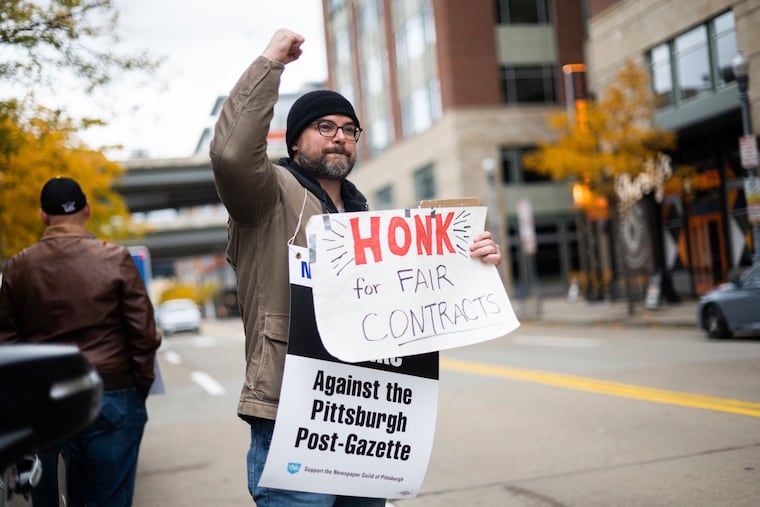Pittsburgh Post-Gazette journalists go on strike but some refuse to join the picket line
The controversy around the strike suggests the difficulty, and rarity, of union solidarity actions even in a time of high public support for organized labor.

In a situation that lays bare the difficulty of union solidarity even at a time of high public support for organized labor, journalists at the Pittsburgh Post-Gazette went on strike Tuesday — without the resounding support of their members.
The Pittsburgh News Guild voted Monday 38-36 to strike, joining 60 of their colleagues — mailers, drivers, pressmen, and others — who had already been on strike since Oct. 6.
Some journalists have refused to honor the strike and continue to work. Others have left the union in protest.
The newspaper workers — from reporters to finance staffers to pressmen — have been in a yearslong struggle against their owner, Block Communications Inc., owned by the Block family. They’ve been working without a contract for more than five years. The 100-member Guild has several open cases against the paper’s owners currently moving through the National Labor Relations Board process. And in 2020, it authorized a strike that never came to pass.
But the circumstances around this month’s strike vote were unusual.
The Communication Workers of America (CWA), which oversees the journalists’ parent union, told the Pittsburgh News Guild that if it did not join its coworkers on strike, they would lose their union charter.
CWA bylaws state that all locals must honor picket lines. In union parlance, this is known as a “solidarity strike.”
When their colleagues first went on strike earlier this month, Pittsburgh News Guild members decided to withhold their bylines from articles, and ask members not to go into the office and cross the picket line, said Zack Tanner, the Pittsburgh Guild’s president.
Despite the ultimatum from CWA, Tanner said, the strike was the right thing to do.
“We wanted to join our union colleagues and get wins for both us and them,” Tanner said.
Ed Mooney, CWA district vice president who represents 50 of the Post-Gazette workers already on strike, said his members were on strike because the company had offered them a much worse health care plan — one the News Guild members currently have.
There’s also the looming prospect of the paper shutting down its print operations, which is the lifeblood of many of Mooney’s members. The Post-Gazette prints just twice a week now.
The owners, Mooney said, hired lawyers who are “hell-bent on breaking the unions.”
In an email to employees today, management wrote: “Nobody can lose their job because they are not a union member. In fact, more than 40 Post-Gazette Guild members have already resigned from the union and are continuing to work.”
Tanner said that he could not confirm this number and that at least one has rejoined after discussions with the local.
In a statement, a Post-Gazette spokesperson said, “Over the past three years, Guild employees’ top wage scales have increased 8%. For the workers from the production, distribution and advertising unions currently on strike over health care, the Post-Gazette has offered several proposals, one of which included a 9% wage increase and enrollment in the company’s health care plan, which currently covers 2,600 Block Communications employees, including several unions, company executives and staff at the PG. None of these solutions were accepted.”
Reporters are frustrated, saying at the four-hour-long strike vote meeting that they felt cornered into voting for a strike, two reporters said. Strike pay begins at $300 a week. Some worry that they will be fined by the CWA for not honoring the picket line.
Tanner said his local will not discipline any members who do not participate in the strike. The CWA did not respond to requests for comment.
Bill Fletcher Jr., a former senior AFL-CIO staffer who has written several books on unions, said that in general, workers are not used to solidarity actions because it’s been decades since the labor movement has engaged in them at any scale. The last general strike — before they were outlawed by the Taft-Hartley Act — was in 1946 in Oakland.
“We don’t have an experience of that scale of mass solidarity striking,” he said. “It’s an alien concept — because it was suppressed.”
The Pittsburgh News Guild has had a difficult run in recent years. The former president, Mike Fuoco, was ousted in 2020 over sexual misconduct allegations. He resigned months after his union voted to authorize a strike after the paper’s owners said bargaining had come to a standstill — a point the union contests.